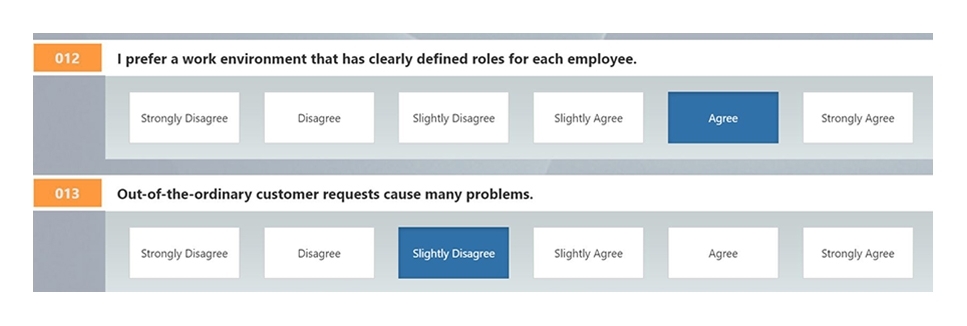We only have one chance to make a first impression: that mindset affects how we introduce ourselves and certainly how we approach the hiring process as candidates. You may have felt the urge to present yourself in the best possible way – hopefully while staying true to who you are when taking an assessment or completing a job application. But hiring assessment tools are supposed to be objective and valid. Can this natural tendency to “fake good” on a hiring assessment eliminate its ability to identify quality candidates?
Understandably, this is a frequent concern of leaders considering adding assessments to their hiring process. Let's get into it.
Fast Facts on Faking with Hiring Assessment Tools
In truth, applicant faking is not always a threat to the ability of an assessment to select quality hires. To share the why and how here are five “fun” (well, if you love psychology or hiring great people!) facts about faking to consider first that apply to how we design assessments:
The Facts
1. Validated + Reliable Hiring Assessment Tools
Our assessments are validated on both current employees and applicants. The tests consistently identify people who are more likely to perform the job, fit the intended culture and brand, and stay for the ideal amount of time. This means if faking were interfering with the accuracy of the assessments we would know from lacking validity evidence.
We also look at reliability. If we ask a candidate to take an assessment at two different points in time, separated by a number of months, will they remain consistent? Retesting, on traits that shouldn't change much over time, shows very little statistical change, even when people would be motivated to fake their results. In a study conducted on applicants who were rejected from a role retested after six months, a circumstance where they might want to change their responses. Yet with a sample size including thousands of candidates only five percent showed statistically significant differences, and only about half of those differences were improvements.

Select performance gains for candidates passing Corvirtus assessments.
2. Variability in Responses
We rigorously monitor the frequency of each response both within and across organizations and positions. Applicants give responses across the entire continuum – even for items that may seem prone to faking. Example: candidates who strongly prefer routine and may not be well suited to a customer-facing role are likely to strongly endorse an item indicating that “out of the ordinary customer requests cause problems.” Job seekers who are best fit for a role that doesn't require near constant customer interaction might respond with a lukewarm response (like Slightly Agree, or Somewhat More). By scoring multiple questions measuring these traits we can identify these candidates that are likely to struggle to thrive and perform.
3. Measuring multiple traits in multiple ways.
Our assessments are designed to disguise what traits are measured. Corvirtus scoring is proprietary and we frequently measure several competencies and traits in the same assessment. This makes it difficult for applicants to determine a desired response. What’s more, each assessment contains items scored in different ways and it’s impossible to pass or receive a high score by endorsing all questions at the highest level. Unscored “distractor” items are included in each assessment as well, to not only obscure how the assessment is scored – but also allow us to include additional traits and information for hiring managers to use in the assessment result.

4. Faking it until I make it
Interestingly, evidence supports that if applicants can fake an assessment they have a high probability of making it on the job. Let's say an applicant is applying for a leadership position in healthcare. They may understand that “out of the ordinary patient requests” are part of the job and an opportunity to provide patient-centered care. An introverted candidate for a sales job knows the role will stretch them outside their comfort zone for relationship building and time spent with others. If a candidate exaggerates their potential it might reflect and understanding of the demands of the position. Assessments often ask about factual events or our reputation and how we are perceived, that is more resistant to faking. Think: people generally view me as..." They might also require a candidate to respond to a tough situation and make tough choices as is the case with situational judgement tests.

5. Hiring assessment tools = efficiency + accuracy in the interview
It's easy to overlook how hiring assessments before the interview stage benefit applicants. These tools not only prevent the damaging experience of a poor job fit, but guide candidates to opportunities where they can thrive. Assessments signal your culture as well as expectations to job candidates making them more informed for the interview process.
The information gained from a hiring assessment also accelerates the efficiency and accuracy of the interview process. Assessment reports provide targeted questions on the greatest areas of opportunity. This cultivates deeper and more useful conversations. On top of that Corvirtus assessment results provide clear, easy-to-understand information for managers and leaders to coach and support new employees in their first days and months on the job. We know the risk of turnover is high early in employment and assessments are focused on finding those red flags.
Maximizing hiring assessment tools for accuracy
People will always emphasize their strengths in an interview, but hiring assessment tools provide targeted evidence-based information to make the most of both who and how you interview. Coupling validated assessments with structured interviews delivers the most effective and efficient way to cut through self-presentation, avoid bias, and understand a candidate’s full potential.
Building or updating your hiring process requires a lot of work. Each piece lives within your broader hiring ecosystem. If you're thinking through how to best connect each touchpoint of how you hire, our eBook might be worth a look - Hiring Assessments - The What, Why, and When of Assessments.





